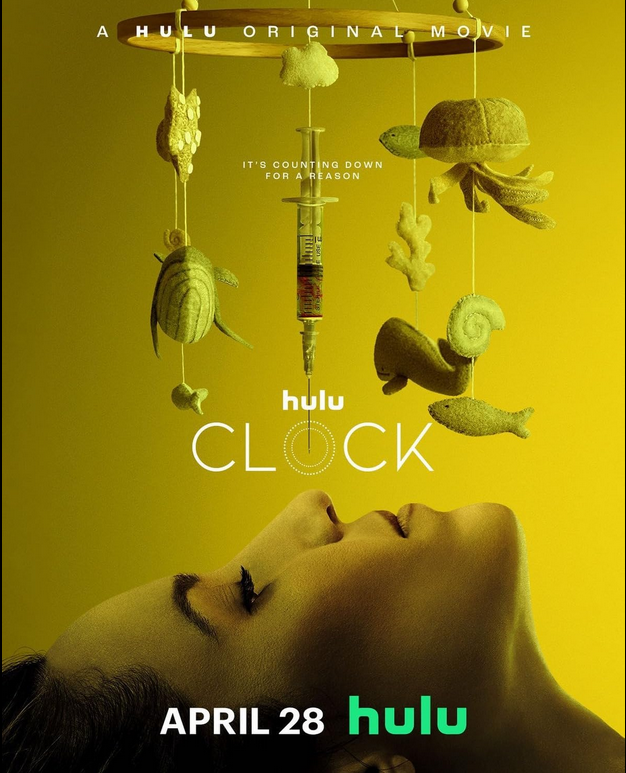One of my favorite ways to pass time is to scroll through one of my streaming apps and pick random movies that I’ve never heard of to watch. Often, these turn out to be indie films with little recognition, but they can end up being enjoyable watches. Sometimes, they can even have powerful messages. That was the case with tonight’s movie. I watched Clock (2023), a psychological horror film starring Dianna Agron (or as I know her, Quinn Fabray), that explores the intense societal pressure on women to have children, even if they’re child-free.

My only knowledge of this movie before I clicked on it came from the summary, which stated that a woman in her late 30s tries to fix her “broken” biological clock. It is a horror movie, so I went in expecting a woman with fertility issues to go through some kind of treatment that has scary side effects. Well, that was only half right.
Clock Movie Plot Summary (Spoilers Ahead!)
The movie begins with an unidentified woman standing on a swing. She’s profusely bleeding from between her legs, and she’s obviously distressed. She looks at her bloody hand before hauling herself over the bar at the top, wrapping the chain around her neck, and ultimately committing suicide by hanging. We then see a small device drop out of her hand and into the puddle of blood below her – a small gear-like device that you might find in a clock.
We quickly transition then to our main character, Ella Patel, attending a friend’s baby shower.
While her and a group of friends are discussing the upcoming birth, the other women there start questioning when Ella and her husband, Aiden, will start having kids. She stammers and tries to come up with an excuse until the mom-to-be says that Ella doesn’t want kids. And she says it with a pretty disapproving tone of voice. Or perhaps she knew the onslaught of unsolicited input that was about to come.
Of course, the other women start in on the general bingos that child-free women hear all of the time:
“Why don’t you want kids? Yes you do, you want kids.”
“But family is everything.”
“Don’t worry, your clock will kick in.”
“I mean, what do you do all day, without kids?”
Now listen, I am also child-free. I know first hand that there are many things you can do within your life to find fulfillment and joy. Ella is shown to be a successful career woman who spends her free time exercising, cooking, working, volunteering in her community, practicing self care, and relaxing with her husband and dog. Her physical relationship with her husband is also very active. Overall, Ella’s life is shown to be very happy and relaxing, filled with activities that she enjoys doing.
But of course, the pressures don’t just stop with her friends.
Her dad is also putting pressure on her to start a family. We learn that Ella is Jewish, and that her grandparents were survivors of a concentration camp in Germany during WWII. Her father’s sole desire is to see his only daughter carry on the family bloodline. They get in many fights about it throughout the movie.
All of these pressures eventually build up. She goes to an OBGYN (suggested by her husband) to get an annual checkup. Here, the doctor tells her about up and coming research that suggests that not wanting kids is a physiological issue and that it’s actually curable with the right treatment. Basically, you can treat the lack of desire for children with medication like you can treat depression… okay then. The doctor gives her an opportunity to enter a clinical trial for treatment. After even receiving light pressure from her husband (the epitome of a fence-sitter), she finally decides to enter the clinical trial without his knowledge (or is it?).
Note: If a fence-sitter says they’re happy with or without children, they’re lying.
Ella drives out into the mountains where she meets Dr. Simmons. The gist of the study is that they’re going to give her a magical cocktail of hormones that will make Ella suddenly want to pop out a baby. During the next few days, Ella undergoes therapy and sensory deprivation, during which she watches a weird video complete with birthing scenes and a pretty gruesome depiction of a fetus swinging from her like a pendulum.” All of this is in the effort to help Ella get over her tokophobia – her fear of being pregnant.
(I’m honestly skipping over a lot here about her familial trauma of surviving the Holocaust. While it does play into her father’s pressure to start a family and her fear of bringing a kid into the world, it doesn’t have much more bearing on the story line.)
The next day, she gets something implanted in her body. The only thing we’re told about this implant is that it is supposed to deliver hormones to her to help her want a baby and ultimately get pregnant. She is also given unnamed medication to take daily (more hormones?)
However, this does not make everything better. Ella starts noticing weird side effects from the treatment. Her ability to see color is diminishing increasingly, to the point where all the paint she sees at the paint store is white. She continuously sees a menacing tall woman who she later finds out to be a representation of her late grandma and the pressure to continue to bloodline. She becomes increasingly erratic until she ends up murdering her dad during a psychotic break in which she thought she was destroying the family heirloom – a giant grandfather clock. Just when he dad was apologizing too and telling her she can write a different story with her life. Darn.
All of this combined with her weird new obsession with eggs makes for an interesting 2nd act.
We next see Ella at her house in a daze. This is where Aiden finds her with bloody hands. While Aiden begins helping her wash off her hands, they become intimate (as people do I guess?), and start having sex. It’s important to note that Dr. Simmons told her to wait 3 weeks to have sex after getting the implant, and it has only been 2 weeks. Because of this, Aiden’s penis ends up being… sliced? Cut? Either way, the implant does some damage, and we get a super surprising close up jump scare of his penis. Like, I had to rewind to make sure that I actually saw what I thought I saw. It was so unexpected, my brain didn’t even process it.
When Ella goes to grab Aiden’s bag for gauze (he’s a doctor so I guess he just carries that stuff around), she sees the symbol for the clinical trial on his bag. This reveals that Aiden knew the entire time that she was part of the trial. He sent her to that OBGYN as his way to get her to do the trial, but make it seem like her idea. Basically, he’s despicable. Forget what your wife wants, lets manipulate her into putting a bunch of hormones into her body because there’s obviously something wrong with her that needs to be fixed! THIS is why I say, don’t marry a fence sitter if you are child-free!
Ella storms to the site of the trial and confronts Dr. Simmons. After a back and forth where Ella almost agrees to do IVF (because she thinks she wants a baby), she finally takes back her autonomy and states, “My wanting children. That’s a delusion [too]. Isn’t it? …. I was natural, I am natural however I am!” Hell yeah you are, Ella. Don’t forget it.
Demanding the implant be taken out, she confronts the pressure of continuing her familial lineage and basically bitch slaps the tall scary woman with a lunch tray. Except the tall scary woman was never real, and she smacks Dr. Simmons instead. Ella then takes a pair of pliers and pulls it out of herself, revealing the same small cog we saw at the beginning of the movie. What I didn’t notice before is that the movie, which started out very brightly colored, had slowly transformed into a gray scale. Everything was very washed out. When she removed the implant, color rushed back to the scene, showing that she was losing the color and vibrancy in her life by pursing something that she didn’t actually want. By taking back control the color comes back into her life.
Oh no! The police have arrived. Aiden called the cops on Ella after discovering Ella’s dad’s mutilated corpse. A chase ensues, and Ella, realizing what she has done to her dad, pulls over on the side of the road and runs off a cliff, ending her life. Ella wakes up on a rock and sees the first fish that walked out of water, effectively confirming she is dead and in the afterlife.
Themes & Symbolism: Societal Pressure, Parenthood, and Autonomy
When I realized that this movie was going to be about a child-free woman facing the societal pressure of having children, I was actually pretty excited. You see, I’m a 25 year old child-free woman myself. And this movie is SO relevant because I’ve heard all of the same bingos that Ella heard in the beginning of the movie. And I’m sure plenty of other women (AND men!) have heard them too. It is such a relevant topic in today’s society. Even politicians are pressuring people into having kids!
I think this movie could have been a great message about accepting yourself for who you are and being happy, child-free or not. However, I think it missed the mark a bit. For one, it was a bit all over the place. I didn’t talk much about it, but the movie had a very heavy theme of her Jewish ancestry and her grandparents survival of the Holocaust. While I understand how it played into the plot, I felt it was a bit… unnecessary. It could’ve been replaced with any other religion and still made the same points. Perhaps I feel this way because I am not Jewish. Perhaps in Jewish faith, having big families and carrying on the bloodline may be more significant. These may have been lost on me since that is not my faith. However, it just kind of felt like it was trying to make a statement on the Holocaust while also making a statement on women’s autonomy. (After more investigation, I found that Dianna Agron is Jewish, which may have been why it was so heavily emphasized in the movie).
Second, I think that Ella dying in the end did a disservice to the overall message. I’m assuming the message is that women can be happy and fulfilled without children, and that there is nothing wrong with a woman not wanting kids. There is nothing wrong with her, and she certainly does not need to be fixed. However, I think the message could’ve been driven home a bit more if we see Ella moving on with her life and still being a happy, fulfilled business woman. That way, we could see the rest of her child-free journey unfold.
Now, that might have been a bit difficult since she murdered her father, but honestly I think she could’ve actually destroyed the grandfather clock and it would’ve had the same effect.
Final Thoughts: Does Clock Deliver its Message?
Overall, I give this movie 3/5 stars. I think it had a really important message, but it got a bit lost in the craziness and had an unsatisfying ending. While there were some unsettling scenes, they also relied on cheap jump scares to scare the viewer.
Enjoyed this post? Read my other movie reviews here!
